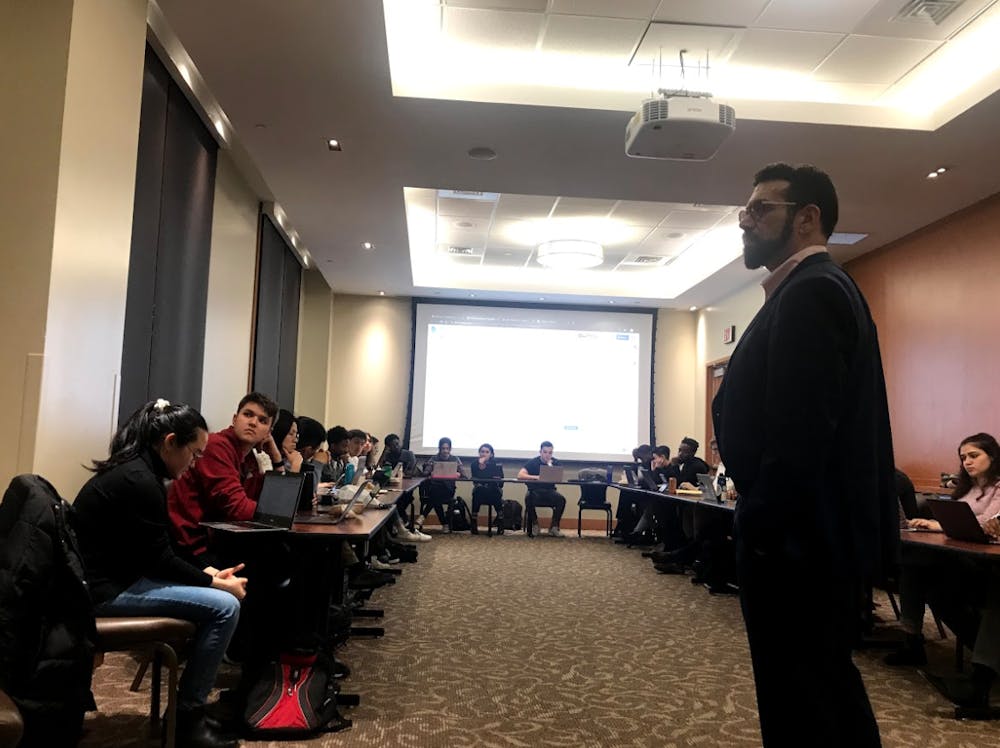This Tuesday, the Student Government Association (SGA) discussed the University’s plan to restructure the academic calendar, giving their feedback to Vice Dean for Engineering Michael Falk. They also discussed and passed the Multicultural Leadership Council (MLC) Recognition Governing Board Bill and Green Jobs Panel Funding Bill.
The main focus of SGA’s meeting was to discuss the administration’s propositions to shift the academic calendar. Falk came to the SGA meeting to answer any questions about the calendar and get their opinions on the changes. He explained why University President Ronald J. Daniels wanted to change the academic calendar.
“The upper administration under Daniels and the University plan wanted all the academic calendars for the different units aligned, with the idea being that this will facilitate students or programs that cross divisions,” Falk said.
He added that the beginning and ending dates of the calendar are beyond his control because they are set by the upper administration and the total number of days in a year cannot be changed because they are mandated by federal law. The administration only has control over setting the time of the breaks, reading period and final exams.
According to Falk, the main issues in the proposal is whether to have seven consecutive days of final exams, including the weekend, or to have five consecutive exam days, followed by a weekend with no exams, then two final days of exams. Some complications with proposing to have exams on the weekend would be having to account for students who have religious obligations and observances.
Another issue rises following the plan for winter break where the proposed changes for spring break may impact the amount of time for intersession classes. If Martin Luther King (MLK) Day fell on the fourth Monday of January, classes would start on the Tuesday before MLK Day. If this were to occur, the total instruction days for the intersession period would be reduced from 14 days to 11 days. If classes began on the fourth Monday as usual, the last day of class would be on Friday followed by the reading period.
Junior Class Senator William Cho raised a concern about whether the University was compromising intersession days for the Biomedical Engineering (BME) students. He acknowledged that many students would be upset at the news of a shortened intersession period. However, Falk clarified that their goal was to provide additional reading days for the students because BME students also have a design exposition day in addition to finals.
Cho also questioned how much the administration would consider student opinions when making final decisions.
“Does that mean that at the end of this year, whatever being agreed on is what’s happening next year? Is there some alternative where if students were to say, ‘We don’t like any of those options,’ for example, can we just scrap this altogether and keep next year as what we normally do?” Cho said.
Sophomore President Nathan Mudrak asked if the administration would communicate with students, other than through email, to inform the community about the changes. Falk responded that the decision will be made soon.
Executive Treasurer Eric Armstrong called for a weekend during finals.
“I also think there is a mental health element as well as an academic performance element. I think there would be so much student fatigue with seven days of continuous exams,” Armstrong said. “Also, they would probably be able to perform better if they had a rest day rather than continually doing exams.”
Falk responded that administration is still trying to get student input and asked SGA to help get more opinions on the issue.
In addition to changes in the academic year, Mudrak requested that SGA co-sponsor the Center for Social Concern’s Absentee Ballot Party on Feb. 14. SGA passed the bill.
Next, Senior Class Senator Chase McAdams proposed the Multicultural Leadership Council (MLC) Recognition Governing Board Bill. Sanjana Boyapalli, director of Campus Engagement for the MLC, expressed the importance of different groups working together.
“Our main objective is to increase the visibility of organizations on campus and give grants and fundings as they need it. We are here to help them collaborate between one another and create a sense of community among the cultural groups on campus,” Boyapalli said.
Armstrong questioned whether the larger cultural group will be taking more money from other groups. However, McAdams clarified that MLC is not recognized as a student group but as a governing board and is thus ineligible for funding.
“MLC will not be taking in any money from the groups but will be required to distribute funds to the groups. The main purpose of MLC is to improve the organization and structure among the 200 cultural groups on campus,” he said.
SGA ultimately decided to pass McAdams’ bill.
Senior Class Senator Chanel Lee proposed the Green Jobs Panel Funding Bill composed by Connecting Green, a student-run group that works on expanding student access to sustainable jobs and internships. As the head of the Health, Safety and Sustainability committee, Lee is co-hosting the event and requested funds from SGA for their upcoming panel event on Feb. 11. The bill passed.
Sophomore Elly Ren, an organizer for Connecting Green’s panel event, detailed the importance of having the club on campus.
“Connecting Green team started in 2011 when students felt that there wasn’t really an outlet for environmental and sustainability-related careers. As an Environmental Studies student, I can attest to the lack of opportunities on campus,” she said.
SGA also passed the Climate Emergency Resolution that Junior Class Senator Lana Weidgenant proposed. She recommended that administrators devote more resources toward climate change research and increase environmental and sustainability education.





